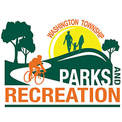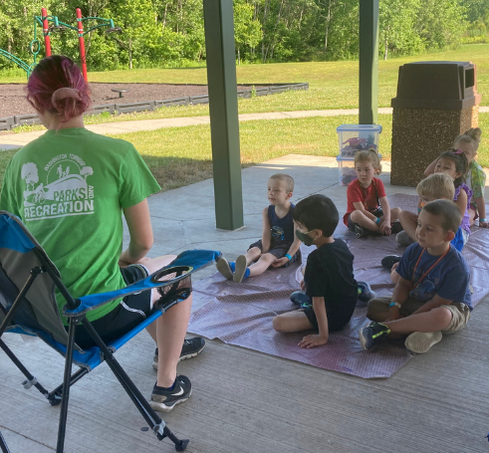Counselor Perks
Why Should You Become A Counselor?What are the true benefits of working as a camp counselor for the summer? What makes it uniquely different from other summer jobs or internships that a college student might land?
No matter what your major, and no matter what your longterm career goals, camp counselor work is one of the smartest ways to spend your summer— both for you personally and for your future employment prospects. |
1. Responsibility
Working at a summer camp means accepting the important responsibility of caring for other people’s children. It means having a real sense of duty to make sure campers stay safe, both physically and emotionally.
2. Teamwork
Working together with other staff members is a core feature of life as a camp counselor. We are all on the same team, collaborating, depending on each other, and supporting each other as we take on tasks at camp. There’s simply a real need for teamwork in a camp setting because there are so many staff members sharing mutual goals
3. Selflessness
Accepting the of a camp counselor job and being a contributing member of a team both require a true sense of humility. At camp, you have to be quick to put others before yourself. As you pay attention caring for children, teaching them, and leading them through the complexities of life at camp, you’ll find yourself responding to their needs and pitching in to help others do their work.
It’s a rewarding shift away from being self-absorbed, and toward an ethic of service. Instead of your day being “all about you,” camp life is practicing how to place “we before me.”
4. Leadership
Camp counselors are leaders. Along with their co-counselors, they provide guidance to the children under their care. They serve as positive role models helping campers make better decisions, providing motivation and suggestions for overcoming challenges, and influencing the interpersonal dynamics of their groups. Through their caring attitude and enthusiasm, counselors literally “set the tone” for their campers, directly affecting their camp experience. As campers look up to them everyday, being a counselor requires real leadership skills, a kind of charisma, and steady confidence.
Camp counselors lead by showing the best side of themselves, being thoughtful and attentive to their campers’ concerns. It doesn’t take long for children to recognize that leadership, and to admire it.
5. Management
Camp counselors are also managers. Their role at camp includes helping groups of children get things done as they should, from cabin chores to dining hall procedures. Counselors must ensure that their campers are informed about daily opportunities, that their activity areas are organized, and that they coordinate with other staff members. They have the authority to uphold standards and camp rules that keep everyone safe.
Faced with day-to-day tasks and goals, counselors apply their leadership skills to manage their campers, helping them navigate the complexities of camp life and get the most out of the experience. In the most basic sense, camp counselors keep it all going.
6. Problem Solving
Life as a camp counselor often involves solving problems. Living and working with children at camp, for example, there are bound to be interpersonal conflicts between campers. The weather is likely to upend the logistics of a planned event. Almost every day, it seems, the regular schedule will need to be changed, and inevitably, a camper group will struggle in some way.
Counselors know to stay flexible at camp and to be ready with alternative, creative solutions when necessary. It’s in the very name; they’re ready to counsel whenever an unexpected problem crops up. As good managers and leaders at camp, counselors are skilled problem solvers too.
7. Decision Making
Camp counselors make decisions all day long. They are faced with choices about how best to guide their campers as they adapt to the independence of summer camp. Like all teachers, they must decide what is the best way to engage and instruct the campers attending their activities. Throughout the day, counselors often find themselves in new situations where they must consider different points of view, gather advice from others, and think carefully about the possible outcomes of a specific choice.
Moment to moment, they rely on their training and values to decide how to respond to requests, how they’ll encourage and counsel their campers, and what they’ll do to contribute to the camp community.
8. Communication
Camp counselors are excellent face-to-face communicators. Joining the highly social environment of the camp community, they communicate constantly with other staff members, campers, directors and at times parents. They have in-person conversations with everyone at camp. They sing and perform for large groups during assemblies and at meals.
Counselors are encouraged to express their true selves and develop positive relationships with those around them, all without the abstraction and filtering ordinarily provided by their smartphones and social media. The real world of camp teaches you to reach out and be present for others.
9. Listening
Camp counselors are good listeners as well. They are known to be highly engaging people, happy to know and learn from those around them. Counselors develop their listening skills by paying attention to everyone in the camp community and then being compassionate, supportive and helpful.
They listen to celebrate the achievements of others, to validate respectfully and without judgment how someone is feeling, and to offer genuine encouragement about next steps. Through the ups and downs of the many relationships you’ll have at camp, your empathy and active listening skills will grow.
10. Self-Awareness
Camp counselors are extraordinarily self-aware. Their focus on creating a safe, healthy environment for children, the quality of the many relationships they form a camp, and the caring attention they show toward the emotions of others, create invaluable opportunities to learn about themselves. Daily life as a counselor is fun, but is also bound to be challenging at times. It will test your strengths and weaknesses, your resilience, sense of humor, and your character.
Working at a summer camp means accepting the important responsibility of caring for other people’s children. It means having a real sense of duty to make sure campers stay safe, both physically and emotionally.
2. Teamwork
Working together with other staff members is a core feature of life as a camp counselor. We are all on the same team, collaborating, depending on each other, and supporting each other as we take on tasks at camp. There’s simply a real need for teamwork in a camp setting because there are so many staff members sharing mutual goals
3. Selflessness
Accepting the of a camp counselor job and being a contributing member of a team both require a true sense of humility. At camp, you have to be quick to put others before yourself. As you pay attention caring for children, teaching them, and leading them through the complexities of life at camp, you’ll find yourself responding to their needs and pitching in to help others do their work.
It’s a rewarding shift away from being self-absorbed, and toward an ethic of service. Instead of your day being “all about you,” camp life is practicing how to place “we before me.”
4. Leadership
Camp counselors are leaders. Along with their co-counselors, they provide guidance to the children under their care. They serve as positive role models helping campers make better decisions, providing motivation and suggestions for overcoming challenges, and influencing the interpersonal dynamics of their groups. Through their caring attitude and enthusiasm, counselors literally “set the tone” for their campers, directly affecting their camp experience. As campers look up to them everyday, being a counselor requires real leadership skills, a kind of charisma, and steady confidence.
Camp counselors lead by showing the best side of themselves, being thoughtful and attentive to their campers’ concerns. It doesn’t take long for children to recognize that leadership, and to admire it.
5. Management
Camp counselors are also managers. Their role at camp includes helping groups of children get things done as they should, from cabin chores to dining hall procedures. Counselors must ensure that their campers are informed about daily opportunities, that their activity areas are organized, and that they coordinate with other staff members. They have the authority to uphold standards and camp rules that keep everyone safe.
Faced with day-to-day tasks and goals, counselors apply their leadership skills to manage their campers, helping them navigate the complexities of camp life and get the most out of the experience. In the most basic sense, camp counselors keep it all going.
6. Problem Solving
Life as a camp counselor often involves solving problems. Living and working with children at camp, for example, there are bound to be interpersonal conflicts between campers. The weather is likely to upend the logistics of a planned event. Almost every day, it seems, the regular schedule will need to be changed, and inevitably, a camper group will struggle in some way.
Counselors know to stay flexible at camp and to be ready with alternative, creative solutions when necessary. It’s in the very name; they’re ready to counsel whenever an unexpected problem crops up. As good managers and leaders at camp, counselors are skilled problem solvers too.
7. Decision Making
Camp counselors make decisions all day long. They are faced with choices about how best to guide their campers as they adapt to the independence of summer camp. Like all teachers, they must decide what is the best way to engage and instruct the campers attending their activities. Throughout the day, counselors often find themselves in new situations where they must consider different points of view, gather advice from others, and think carefully about the possible outcomes of a specific choice.
Moment to moment, they rely on their training and values to decide how to respond to requests, how they’ll encourage and counsel their campers, and what they’ll do to contribute to the camp community.
8. Communication
Camp counselors are excellent face-to-face communicators. Joining the highly social environment of the camp community, they communicate constantly with other staff members, campers, directors and at times parents. They have in-person conversations with everyone at camp. They sing and perform for large groups during assemblies and at meals.
Counselors are encouraged to express their true selves and develop positive relationships with those around them, all without the abstraction and filtering ordinarily provided by their smartphones and social media. The real world of camp teaches you to reach out and be present for others.
9. Listening
Camp counselors are good listeners as well. They are known to be highly engaging people, happy to know and learn from those around them. Counselors develop their listening skills by paying attention to everyone in the camp community and then being compassionate, supportive and helpful.
They listen to celebrate the achievements of others, to validate respectfully and without judgment how someone is feeling, and to offer genuine encouragement about next steps. Through the ups and downs of the many relationships you’ll have at camp, your empathy and active listening skills will grow.
10. Self-Awareness
Camp counselors are extraordinarily self-aware. Their focus on creating a safe, healthy environment for children, the quality of the many relationships they form a camp, and the caring attention they show toward the emotions of others, create invaluable opportunities to learn about themselves. Daily life as a counselor is fun, but is also bound to be challenging at times. It will test your strengths and weaknesses, your resilience, sense of humor, and your character.

